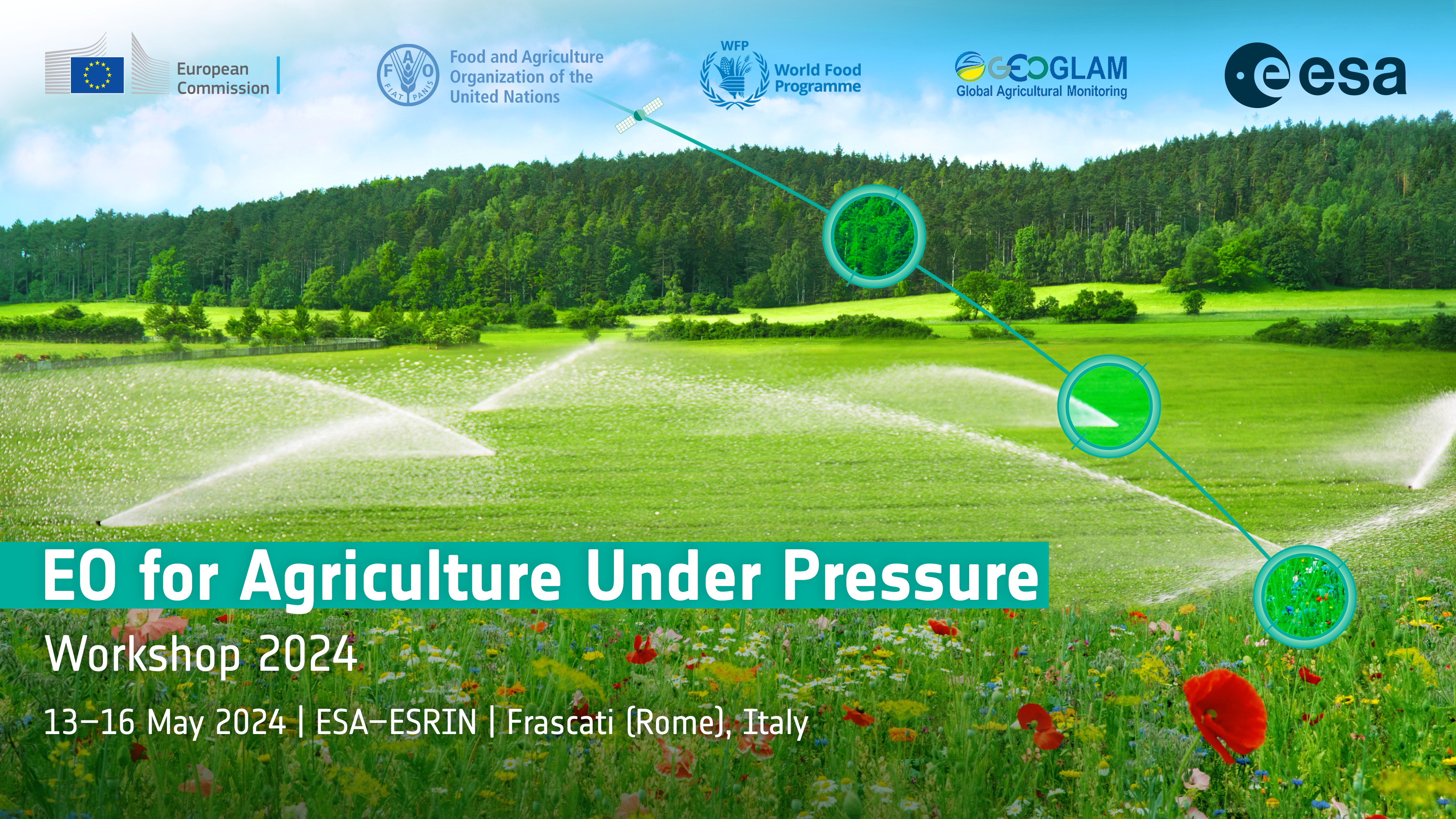
- This event has passed.
EO FOR AGRICULTURE UNDER PRESSURE 2024 WORKSHOP
May 13, 2024 - May 16, 2024
ESA-ESRIN

Background
There is a steadily growing pressure on agriculture and the entire food system to increase the global production, while at the same time ensuring healthy, nutrient-rich products and sustainability both in the terms of sufficient income for farmers and in terms of impact on the soil and other inputs, as well as on the environment and the climate. This challenge is amplified by the impacts of a changing climate, in particular more frequent and stronger extreme weather events, which requires the agricultural production to adapt to become more resilient. In addition, more openly shared, objective information about important market-determining factors such as yield estimates and forecasts is required in order to ensure transparent markets and less speculation, and thereby avoid price fluctuations that prevent a regular access to food for large populations. As was demonstrated in the EO for Agriculture Under Pressure 2020 online workshop, EO is already contributing to solving the food system challenges described above and has the potential to further increase its contribution significantly. Copernicus, through the free and open access to regular and frequent observations of high quality from its Sentinels, in particular Sentinel-1 and -2, has already boosted the development of agricultural applications during the last years. Since the 2020 workshop the Next Generation of Copernicus Sentinels are under preparation as well as the new Copernicus Sentinel Expansion missions which will add e.g. hyperspectral, thermal and L-band SAR capabilities. Recent missions are already demonstrating some of these capabilities, such as PRISMA, EnMAP and ECOSTRESS and soon NISAR. ESA’s Earth Explorer FLEX with expected launch end 2025 will add to these capabilities by measuring the photosynthetic activity of vegetation, opening up new possibilities e.g., in terms of early detection of plant stress. Additionally, a growing number of commercial Earth Observation constellations providing very frequent observations are further increasing the capability of EO to support agriculture. At ESA’s Living Planet Symposium 2022 in Bonn, we already saw many demonstrations of progress, and additional ones in the agriculture sessions of the recent joint EC-ESA workshop on Science for a Green and Sustainable Society in the context of the joint EC-ESA Earth System Science Initiative.
In this context the European Space Agency (ESA), the European Commission (EC), the World Food Programme (WFP), the Food and Agriculture Organization (FAO) and GEOGLAM are co-organising the EO for Agriculture Under Pressure 2024 Workshop following up from these previous events and bringing together the large community working on EO-based science and solutions for agriculture as well as users, including scientists, data and service providers, national and international agencies and other institutions and organisations in order to present and discuss the state of the art, evolving needs, and priority areas for future projects of Horizon Europe and FutureEO.
Objectives
The overall goal of the event is to gather the community in order to present the state of the art and identify main EO research challenges in supporting sustainable agriculture under pressure. This will be pursued by addressing a number of scientific objectives:
- Discuss the role of EO for supporting evidence-based decisions for improving food security at national to global scale
- Explore novel EO observation capabilities to advance the scientific basis to support resilience of agricultural productivity to climate change
- Discuss how to transfer EO science results into mitigation measures and alternative management tools for a sustainable, climate-neutral agriculture
- Exchange on latest developments of innovative algorithms and applications for agricultural monitoring including integration of in-situ data and modelling approaches
- Discuss EO applications for monitoring of agricultural practices, irrigation management, water productivity, fertilizer and crop protection optimization, impact assessment of crop diseases and natural hazards, crop yield and nutrition content estimations and forecasts, and pasture monitoring
- Demonstrate the use of EO for policy relevant reporting and monitoring obligations such as the UN 2030 SDGs, the EU’s Green Deal and Farm to Fork, the Area Monitoring System of the CAP and national agricultural statistics
- Integrate innovative technologies such as Big data analysis, digital platforms, Artificial Intelligence, drones, crowd-sourcing and Internet of Things in agricultural monitoring
- Explore the potential of planned and future missions for food security and agriculture, e.g. the expansion and next generation of the Copernicus Sentinels, FLEX, new space and commercial satellite constellations
- Provide inputs to guide scientific agenda of EC and ESA in the agricultural sector including Horizon Europe and ESA’s FutureEO program.
Topics
1. Impact on climate and environment:
- European Green Deal and its Farm to Fork Strategy
- UNFCCC Nationally Determined Contributions (NDCs) & Global Stocktake (GST)
- Monitoring, Reporting and Verification (MRV) System
- CAP – Eco-Schemes
- Innovative agricultural practices with low environmental impact, reducing GHG emissions, pollution and biodiversity loss
- Deforestation-free products (Detecting commodities, Monitoring crop expansion into natural areas, Commodities value estimation, Modelling potential areas for cash crops production, Traceability of commodities, Supply chain transparency
- Cropland carbon stocks (Carbon credits, Global Sequestration Potential, Carbon markets)
2. Crop stressors and climate adaptation:
- Monitoring stressors and changing growing conditions
- Detection of stress impact and attribution to single or multiple, biotic or abiotic stressors
- Supporting increased resilience and risk management (e.g. irrigation advice and monitoring; insurance)
- Extreme events early warning, monitoring and damage characterization
3. Food security and SDG-2:
- Supporting small-holder farming in Europe and in developing countries, auto-sufficiency and local food
- Soil and crop monitoring
- In-season crop type mapping
- Nutrition content estimation in soils, crops and harvest
- Timely yield estimation and prediction at large and small scales
- Supporting national statistics offices
4. New technologies and infrastructure:
- In-situ data needs and opportunities
- New space and new EO missions
- AI
- Modelling and data assimilation
- Digital Twins
- Arising or changing needs.
For further information on the Abstract submissions, please go to the main website at https://eo4agri2024.esa.int/
